Sat 22 Oct 2022
A Book! Movie!! Review by David Vineyard: JACK DAVIES – Esther, Ruth, and Jennifer // ffolkes (1980).
Posted by Steve under Action Adventure movies , Reviews[11] Comments
JACK DAVIES – Esther, Ruth, and Jennifer. Allen, UK, hardcover, 1979. Also published as North Sea Hijack (Star, UK, paperback, 1980). US title: Atlantic Incident (Jove, paperback, 1980).
Film: Universal, 1980, as North Sea Hijack; released in the US as ffolkes; also released as Assault Force. Roger Moore, James Mason, Anthony Perkins, Michael Parks, David Hedison, Lea Brodie, Dana Wynter. Screenplay by Jack Davies based on his novel. Directed by Andrew V. McLaglen.
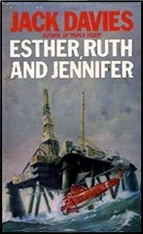
Every collector has those books you look for over a period of years and somehow never come across a copy that is available and you can afford, and then when you do find it, it arrives in the mail, and you complete the anticipatory act of opening your acquisition when the inevitable doubt grips you.
Is it any good?
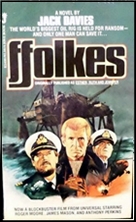
You have spent forty years or more looking for a copy having never read the book, having never read so much as a review of the book, and now it is in your trembling hands, and you face that dilemma; was it worth all this?
In the case of Jack Davies’ Esther, Ruth, and Jennifer, the answer was a resounding, and relieved, yes.
Granted in this case there was a very entertaining action film starring Roger Moore taking a break between Bond outings (Moonraker and For Your Eyes Only) and the screenplay for that was by the novelist, and that writer had written numerous great screenplays, and several good novels, but still, that timorous nagging fear lay heavily on my too often disappointed collectors soul.
Was Esther, Ruth and Jennifer going to be a tremendous let down?
Book and film have the same simple premise. Jennifer and Ruth, the largest of the North Sea Oil platforms have been mined by terrorists who are demanding £25 million or they will be blown-up, crippling North Sea oil production for decades. The hijackers have taken Esther, the state of the art supply ship commanded by Captain Olaffsen, and is holding his crew hostage.
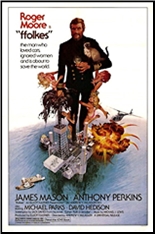
Harold Shulman embezzled from his own company and was sent to prison. There he met psychotic Lew Kramer and they decided to team up, ruthlessness and brutality. The only trick then was to find a target worthy of their ambition.
Anyone who lived through the Seventies probably remembers just how much oil production and prices were on everyone’s mind. Those North Sea Oil Rigs were a lifeline for all of Europe and particularly for the United Kingdom and Norway. I worked on an industrial espionage case involving British Petroleum and the North Sea platforms and the pressure from several governments was intense.
Enter our hero, Rufus Excalibur ffolkes, ex Royal Navy, and eccentric cat loving, woman hating, whiskey (and in kilt-wearing ffolkes’ case that should be ‘whuskey’) swigging, motorcycle enthusiast, and sewing aficionado who has trained his own team of tough sea going privateers for just this sort of thing. Both the British government and the company approach him despite the fact he is almost impossible to work with.
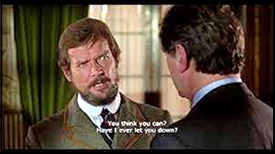
After all, he predicted exactly how the rigs might be hijacked so he has the best chance of saving them.
ffolkes’ plan involves his going aboard Jennifer with part of the team assigned to negotiate the ransom, Admiral Brinken of the Royal Navy and Mr. King from the oil company, but things go awry. Then too the Navy and the company are wary ffolkes’ plan which begins with convincing the hijackers that they have made a mistake and Ruth, out of their line of sight, has blown up because of them.
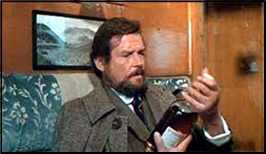
Little can ffolkes expect things will go wrong between rough seas and human error and he will find himself aboard the Esther with one healthy ally he can rely on, Sanna, a female crew member ffolkes mistakenly thinks is a young man at first, as the deadline grows closer.
In the film released in the UK as North Sea Hijack and here as ffolkes it is all in the acting, Moore having great fun as ffolkes, Anthony Perkins as Shulman, Michael Parks as Kramer, James Mason the Admiral, and David Hedison the company representative. On the printed page it is a cleverly and richly told take that, considering the author’s history in film, is a well crafted and often humorous thriller that at times reads as if P. G. Wodehouse was collaborating with Alistair MacLean. The action may be cinematic, but the book compares well with many of the better adventure thrillers of the era by legends in the genre like Canning, Innes, and Bagley.
You never feel as if you are reading a scenario for a film though the film follows the book scene by scene.
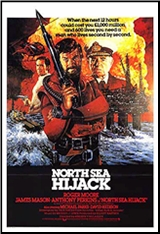
If you love British comedy of the late fifties into the sixties Jack Davies name should be familiar to you from the credits. Jack (John Bernard Leslie) Davies was a British screenwriter whose films include Laughter in Paradise, Doctor at Sea, An Alligator Named Daisy, Gambit, It Started in Naples, The Poppy is Also a Flower, Monte Carlo or Bust (aka Those Daring Young Men in Their Jaunty Jalopies based on his novel), Paper Tiger (with David Niven and Toshiro Mifune also based on his novel) and the Oscar nominated best original screenplay for Those Magnificent Men and Their Flying Machines. His lines read by a veritable who’s who of Hollywood stars including Clark Gable, Sophia Loren, Michael Caine, Shirley MacLane, Alex Guinness, Tony Curtis, David Niven, Yul Brynner, Rita Hayworth, and more.
Three of his four novels were made into films unsurprisingly.
Whether in novel or film form this is simply an entertaining romp, but I have to say with great relief, after years of looking for it, the book is everything I wanted, and packs far more into less that three hundred pages of smallish print than most of today’s bestselling high concept thrillers bloated out to doorstop size.
Davies knows when to be terse and when to be expansive, when to draw to his heroes eccentricities and when it is too much, which is the key to this kind of character working.
And, the ending of the book, as the ending of the film did, hits just the right note, a smile and not a laugh relieving considerable tension.
October 22nd, 2022 at 11:42 pm
I have no experience with the novel; but the film is one I know pretty well.
Honestly, I’ve always been rather embarrassed to admit how familiar I am with this flick. I don’t know how I ever came to encounter it.
At one point I likely knew every scene and line of ‘ffolkes’ by heart. I had somehow watched it repeatedly, through no aim of my own. No idea why. It transpired during an episode in my fall-from-grace when I was briefly sequestered indoors watching cable TV movies day-after-day-and-night-after-night.
I’m gratified and somewhat surprised to learn someone else with many years of established and discriminating good taste admires it. Also, curious.
The above ‘ffolkes’ review (#1 in this thread) effuses more fervor than I can myself ever conjur up –but, that being said –I also say it is not difficult to empathize with the fanship.
It’s not a bad movie (but) I’d maintain that it is just …well …an odd movie. Highly odd. It sticks in the memory, but for all the wrong reasons.
Ah! (scrolling up) I note that Andrew V. Mclaglen is responsible, a director always so consistent and reliable. He directed (at least) two of my fave titles, “Dark of the Sun” and “Young Cassidy”. I like his work.
Back on track. I can see how someone might really dig “ffolkes”. It *does* proceed quite sturdily along; very solidly handled in a nuts’n’bolts manner. Mclaglen was an old hand at the game.
But it is nonetheless strange viewing. At the time, I’m sure I watched it more for the Moore factor. Moore was Bond at the time. The only Bond in town.
Unfortunately Moore is more Moore than more Bond. An English Burt Reynolds. Helluva nice guy but he took nearly every feature film role as ‘time to have fun’. Maddening.
As a leading male in a full-length flick, this gingery gent could shine when he put his mind to it. Just my opinion, mind.
For me, he almost never shone in ratio to the endless minutes I devoted to him. Twice only, did I ever cheer for Moore on the big screen: Andrew V. Mclaglen’s “Wild Geese”. Egad. Now that was one helluva stompin’, thumpin’ action movie. And Moore whaled.
The 2nd instance? ‘The Spy Who Loved Me’ when he kicked MAJOR BUTT with a submachine gun –boiling out of the cargo hold in Stromberg’s tanker. Remember? Goldang! He tromped. Why couldn’t he always be icy like that?
In ‘ffolkes’ he is clearly enjoying himself, and that is somewhat amusing. I agree. But is this enough to sustain an uber-dreary actioner taking place mostly in dull, driving rain and cloaking night?
‘ffolkes’ is mostly: ladders, gangways, and scuppers, hatches, and some brief grappling hooks and two spearguns.
The magnificent North Sea itself, is hardly detectable at all in this gloomy exercise. Rain machines\wind machines, but no expensive sea sequences. Five minutes of, “Ryan’s Daughter” clobbers it.
In a way, the movie is all *too* well handled. Too functional. Too workmanlike. It was probably on-time and under-budget yes. Whereas, the novel likely soared in atmosphere and thunder.
As far as character drama: besides Moore, ‘enjoying himself’ with this tremendously against-Bond character. And it really is a role which javelins over-the-top. It’s anti-Bond, okay. But so much so, that it wearies one. The gag wears itself out.
His ‘ffolkes’ character knits wool, loves cats, and detests all women. Question: how does he earn his daily bread? On his own budget(?), he runs free-lance marine commandos (who are these guys?) and he keeps them at constant readiness to foil an oil-rig hijack, “just in case it should ever occur” (which is the crux of the film).
This truly flexes one’s credibility. I just couldn’t imagine it at all. Would the British government really let a completely private outfit of questionable loonies like this handle a hostage crisis? You see why I have *issues* with this film.
Why do I still have any fondness for it? The unabashed answer: Anthony Perkins and James Mason. I’d watch either actor in anything, anytime, anywhere. Such are their extraordinary talents. Perkins here shows his age, I admit. And Mason is almost asleep. Several notches down even from, “MacKintosh Man”.
But both he and Perkins are still just so fine to observe, anytime, doing anything at all. Perkins has the most ripcord energy in the whole story, you almost want him to succeed. What a freak.
Ah well. I’m at the end of my slipshod and ramshackle remarks. My reviewing is all higgleldy-piggledly compared to the much finer summary preceding mine. But I’ve said me piece; and I’ll no say more. Thanking ye.
October 23rd, 2022 at 7:30 am
“Rufus Excalibur ffolkes,… whiskey (and in kilt-wearing ffolkes’ case that should be ‘whuskey’) swigging,… and sewing aficionado”
In kilt-wearing ffolkes’ case that should be “whusky” (or “whisky”) swigging.
The fact that he’s a “sewing aficionado” is a nice touch – something in common with Field Marshal Lord Kitchener and Ernest Thesiger.
October 23rd, 2022 at 9:47 am
Unless credits fail to matter, Jack Cardiff was the director of Dark of the Sun. Lazy, an otherwise interesting comment, but being sequestered is unusual, more please.
October 23rd, 2022 at 10:37 am
The same thing with Young Cassidy, Jack Cardiff directed after John Ford fell ill.
October 23rd, 2022 at 12:56 pm
Aw, dangit. I’m mixing up Cardiff and McGlagen in my noggin’. Oh well, I still enjoy both directors. But thank you for the correction on this. I’ll have to review McGlagen’s filmography to discover which two movies I was thinking of instead.
Don’t know how to esplain’ my feckless, troubled youth. It wasn’t a Turkish prison or anything like that.
Matt Dillon would simply say: “the wilder the colt, the better the horse”.
Back to Moore: Dick Cavett interviewed him once, and that episode must still be available online somewhere. Affable and charming, he surely was.
October 23rd, 2022 at 3:41 pm
Roger Moore on dick cavett: https://youtu.be/pflFPNfolo0
October 23rd, 2022 at 6:22 pm
North Sea Hijack (full movie). https://youtu.be/DPQua0Hg7N4
October 23rd, 2022 at 7:20 pm
Thanks, Tony — on both counts!
October 23rd, 2022 at 9:58 pm
Moore had just done what was at that time the worst Bond movie in the franchise, one that made money, but got rough reception from critics and fans. The silliness of MOONRAKER threatened both the franchise and Moore’s career as Bond.
He needed and got some kind words for ffolkes where he “stretched” beyond his usual roles though within the same framework. This was followed almost immediately by THE SEA WOLVES where Moore got good reviews playing a British agent far more like the real Bond than the Bond he had played up to that point. Notably he got the best reviews of any of the major actors in the somewhat under performing film (wasn’t that McLaglen again?).
A good many fans and critics consider FOR YOUR EYES ONLY as his best Bond outing so he was on a roll personally however the films performed at the box office after the relative disappointment of MOONRAKER’s reception.
ffolkes is not a great film. It is economically made (to be kind), and no one will ever call Andrew McLaglen (when your ‘masterpieces’ are THE RARE BREED, THE WILD GEESE, and McCLINTOCK, an obvious knockoff of a classic it is not a good thing) an auteur as a director, but Davies knew his way around a screenplay and the cast is first rate while McLaglen is at least workmanlike at action movies. Mostly it is light fun that depends, as I said, heavily on that cast.
After Simon Templar and the Saint it is at least comical to see Moore flustered by a naked woman.
I liked it enough to want to read the book, particularly knowing Davies history, but the book proved hell to find, far overpriced the few times I did find it. I read Davies next book PAPER TIGER (made into an even more questionably entertaining film that I liked) and enjoyed it which meant I wanted to find this one even more.
Re strained credibility, I do see the point, but I cut a bit out of the review for room, the bit about the actual ‘freelance commandos” the character of ffolkes is suggested by including David Stirling the creator of the SAS (see the EPIX series coming up based on Ben MacIntyre’s book), Lord Lovatt of Lord Lovatt’s own Commando (Peter Lawford plays him in THE LONGEST DAY) who invaded Normandy on D-Day in a kilt with a piper leading his commando troops, Fitzroy McLean (one of the models for James Bond), Peter Fleming (Ian’s brother and another Bond model)another freewheeling commando, and Ian Fleming’s 30 Assualt Unit personal commando unit of special forces Intelligence operatives who captured the German intelligence archives at Tambach in 1945.
That doesn’t even count the likes of T.E. Lawrence, Richard Meinhertzhagen (even when you edit out his lies the truth is fantastic), American Rangers leader William Darby, German Paul Von Lettow, German Otto Skorzeny, and Post War commando and explorer Sir Ranulph Fiennes, and I am leaving out some of the more colorful examples.
History is scattered with these eccentrics from Robert Rogers to John Singleton Moseby. Throughout history Special Forces operations are littered with these unlikely eccentrics.
ffolkes is a piker when it comes to eccentricity in this department, but I should mention the books spends some time establishing who ffolkes is and why his eccentric personal unit ends up being called upon. The film touches on it but doesn’t really dwell.
This happens fairly frequently where Hollywood has to tamper down what actually happened because no one would believe it. Who would guess that Graham Greene’s OUR MAN IN HAVANA was based on the even more spectacular true exploits of the most successful agent of WW II or that the invasion of Sicily succeeded because of a corpse?
October 23rd, 2022 at 11:22 pm
Aha. Bravo. Well argued (#9). Enjoyed the mention of Meinhertzhagen. Off the hook, that guy.
I’m a big fan of Peter Fleming too. I’ve read his “Admiral Kolchak” and “Brazilian Adventure”, so far. Superb. Easy to see why Ian revered him.
Anyway, I can hardly disagree with any of these very rational arguments above (#9). Nor would I want to. I’m not arraying myself against the position taken. I’m somewhat on the same side, except for some ‘particulars’.
I surely do not hate ‘North Sea Hijack’; but if drawn into a chat about it, my angle is: why didn’t it turn out better? What does it lack?
I don’t oppose anyone being a big fan of ‘ffolkes’ –only (as I stated) hearing an in-depth book/movie review simply made me curious. I wanted to know why someone really goes in for it.
I too have many oddball films I relish –films for which I cannot explain my relish –but when it comes to this flick I just wanted to dissect a little. Since I happen to recall it pretty well (unlike my recall for the name of Jack Cardiff, ooooff!)
For a brief second (after reading msg #1), I wondered whether I had possibly missed something meritorious in ‘Assault Force’. But then it strikes me again, how many times I actually viewed it. Too many times.
So I’d gently stick by my ground, and maintain that it’s a deucedly odd movie. Not odd in terms of facts but odd in terms of emotion.
Movies aren’t experienced rationally, as we know. Facts don’t cement a film in one’s favor. It might be plausible on paper, but I just couldn’t go along with the premise on screen. What saves the film for me is the vicious snarling Anthony Perkins and the effortless calm of James Mason.
Roger Moore stuffed into a snug orange wetsuit, his face obscured by a snorkel mask, brandishing a speargun, is (for me) what detracts from the film adaptation. The movie might have been a romp if there were more scenes where ffolkes ‘rubs circulation back into the legs of a crewman he doesn’t realize is female’. That was, yes — a chortle.
Oh well. All this is not to say that a quirky movie, can’t appeal to an experienced aficionado of the action genre. This discussion we’re having proves that it can, and has.
I too have a rearward-facing fondness for it, but in the way that I tried to describe above. It’s an ‘afterthought’ of a film for me, rather than one I ever reflect on deliberately. A film I encountered by accident. What could this film have been instead of what it is? For that matter, what could Roger Moore have been?
Moore always got a special place in my heart for his Bond days but perhaps, compare Moore to someone like Michael York. Moore could have had the same kind of fame as York if he’d worked at it.
I know Moore has legions of ‘Saint’ fans. But consider him in something like, “That Lucky Touch”. Perhaps his choice of acting style was better for TV rather than feature films (and I say this without being mean, chivvying, or detracting).
Ulp. Exhausted my lungpower for the moment. Fins!
October 23rd, 2025 at 11:48 pm
I just finished “The Enemy Below,” with Al David Jansen in the cast, and through wikipedia, found out he was in “ffolkes.”
I remember catching it on TV sometime in the mid 80’s and wondered if that character’s adventures continued in a series.
Evidently not, in book or film. Oh well.